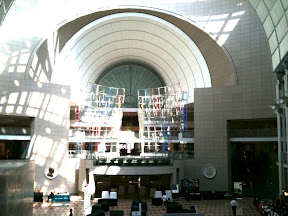 Originally posted on http://www.andrewdwelch.com at http://www.andrewdwelch.com/2010/04/service-leadership-highlighted-at.html.
Originally posted on http://www.andrewdwelch.com at http://www.andrewdwelch.com/2010/04/service-leadership-highlighted-at.html.
Leadership is about Relationships
Peter Ronayne, from the Federal Executive Institute, suggested that leadership is an inherently social activity. Leadership development is a lot about what happens in an experience, creating the emotional connection and not obsessing over the class or the instruction. In blended or e-learning, or telecommuting environments, there is a need for leaders to create these personal connections and to do this face to face. It is about people getting together to explore ideas and to be challenged to do so. Get to know the people around you in a real and authentic way, and let them know you back.
Jeff Neal, Department of Homeland Security, warns that one does not motivate by evaluating the individuals on the team, and then setting up a system whereby those individuals are told, “if all of you are wonderful, then we have failed because we did not set up a system that better differentiated you.” This systems-driven paradigm is not leadership, and organizations frankly need a better way of developing, recognizing, and rewarding their people. Carol Willett, Government Accountability Office, explained that the “challenge is to create a leadership program without sending people to leadership classes.” That if she has “to pull someone off the line to go to leadership class, then [I] have failed.” Instead, bring people together around real work and real challenges and give junior people the opportunity to develop as leaders in meaningful real-world situations.
Leaders Think
We must develop leaders who are interdisciplinary, who can engage in ambiguity and complexity, and who can lead in a global world. Willett further highlighted that the age of “the boss” telling the junior employee, “you’re not a senior executive kid, so just do the job I asked you to do,” is passe; everyone needs to be a leader now. In 1975, change management was not something that was asked (and was often discouraged) of a Second Lieutenant. Now, though, we need to teach our people how to lead change, not in a destructive sense, but in a way that better serves customers (and it is worth emphasizing that, in the case of government, the “customers” are the citizens we serve).
Be Well
How do we keep ourselves well over the long haul now that people are working later into life? The role that leaders play in nutrition, fitness, sleep, promoting a culture of personal sustainability and longevity will become increasingly central.
The Effort Must be Sustainable after the Visionary is Gone
We need to engineer what we do into the organization’s fabric, such that our successors can carry on with the work that we begin — that good initiatives do not become someone’s “pet project,” only to be discarded when the visionary sponsor moves on.
There are no “Soft Skills” Here
Neal was emphatic that we need to avoid use of the phrase “soft skills” when describing leaders. This stuff is hard, and the ability to lead absolutely cannot be made the second class skill set to the ability to perform technically. People are often hired for the wrong reason, when it is forgotten that technical proficiency does not necessarily beget leadership capability. The problem is exacerbated when those people are not mentored, developed, and allowed to succeed, finally rising to leadership roles only for their failures to become subject to the question of “what went wrong” if things don’t work out. For what it’s worth, Neal commented that the Coast Guard does “incredibly well” surmounting this challenge.
Boldly Pursue the Vision
Many organizations are challenged by lack of vision, lack of creativity, and lack of risk taking. “Leadership,” said one speaker, “is about making sure your tiller is still in the water and you’re going where you need to go.”
The moderator, Jeff Pon, closed with a poignant parable.
The leader approached a group of workers and asked them each what they were doing. The first said, “I’m breaking rocks.” The second elaborated that, “I’m breaking rocks to feed my family.” The third explained, “I’m breaking rocks to feed my family, but I am building a cathedral.”
Who do you think will be the most productive, the happiest, the most committed to the cause?
Peter Ronayne added, “If we are about results, then we have to embrace the notion that work is a thing you do, not a place you go.”



Leave a Reply
You must be logged in to post a comment.